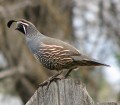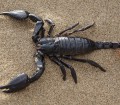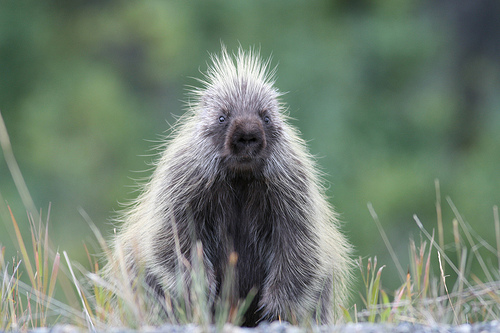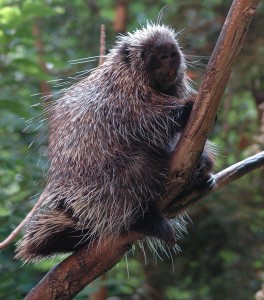The North American Porcupine (Erethizon dorsatum) also goes by the name Common Porcupine or Canadian Porcupine and is the second largest rodent in North America after the beaver. They are very adaptable; living throughout Canada and the United States from coast to coast in a variety climates and habitats.
Porcupines are nocturnal herbivores and very good climbers due to long claws and bare feet
The Porcupine’s obvious claim to fame is his quills which cover the majority of the body except the face, belly and bottoms of the feet. The quills can number up to 30,000 and are modified hardened hairs that are light weight, with a spongy interior and feature barbs at the tips. The quills hollow nature cuts down on weight and also helps Porcupines float better which in turn makes them pretty good swimmers. Normally the quills lay flat but if a Porcupine is threatened they will stick out and can break free quite easily when they come into contact with a predator’s paws or face. These injuries are extremely painful due to barbs working their way in deeper and the quill’s propensity to expand in the wound. Such injuries to the face of a predator can be deadly if they impede the ability to eat. For this reason Porcupines are able to live individually and slowly go about their day only fearing the most desperate attackers. This natural protection also makes the Porcupine one of the most long lived animals in the wild with an average life expectancy of 17 years.
Porcupines are nocturnal herbivores and very good climbers due to long claws and bare feet. They spend a surprisingly large amounts of time in trees- sometimes up to 80% of the day. While in the trees Porcupines sleep and graze on leaves, buds and bark. They are also known to fall out trees from time to time (look out below!) but have developed a natural antibiotic in their skin that protects against self-inflicted wounds from quills. Porcupines also love to eat apples and crave salt which their normal diet lacks. This salt craving means that Porcupines will gnaw on man made items such as wood handled tools and wooden structures that contain salty oils and resins. It is common in some areas for campers to find that while they were sleeping, their canoe paddles have become the midnight snack of a hungry Porcupine.




